英语逆向思维练习二
中考英语思维训练的实践活动练习题50题答案解析版
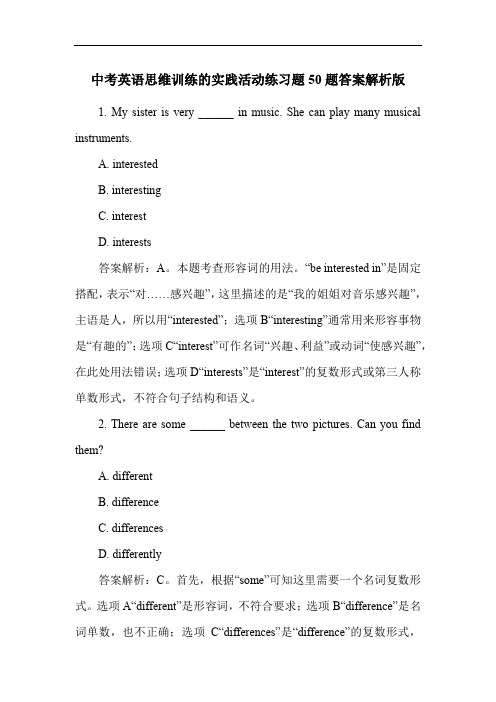
中考英语思维训练的实践活动练习题50题答案解析版1. My sister is very ______ in music. She can play many musical instruments.A. interestedB. interestingC. interestD. interests答案解析:A。
本题考查形容词的用法。
“be interested in”是固定搭配,表示“对……感兴趣”,这里描述的是“我的姐姐对音乐感兴趣”,主语是人,所以用“interested”;选项B“interesting”通常用来形容事物是“有趣的”;选项C“interest”可作名词“兴趣、利益”或动词“使感兴趣”,在此处用法错误;选项D“interests”是“interest”的复数形式或第三人称单数形式,不符合句子结构和语义。
2. There are some ______ between the two pictures. Can you find them?A. differentB. differenceC. differencesD. differently答案解析:C。
首先,根据“some”可知这里需要一个名词复数形式。
选项A“different”是形容词,不符合要求;选项B“difference”是名词单数,也不正确;选项C“differences”是“difference”的复数形式,“there are some differences between...”表示“……之间有一些不同之处”,符合语境;选项D“differently”是副词,不能用在此处。
3. We should ______ the environment and not pollute it.A. protectB. preventC. provideD. produce答案解析:A。
这道题考查动词词义辨析。
选项A“protect”意为“保护”,“protect the environment”表示“保护环境”,符合句子语义;选项B“prevent”通常与“from”搭配,“prevent...from...”表示“阻止……做某事”,在这里用法错误;选项C“provide”意为“提供”,与句子语义不符;选项D“produce”意为“生产”,也不符合语境。
中考英语逻辑思维能力考查练习题30题(答案解析)
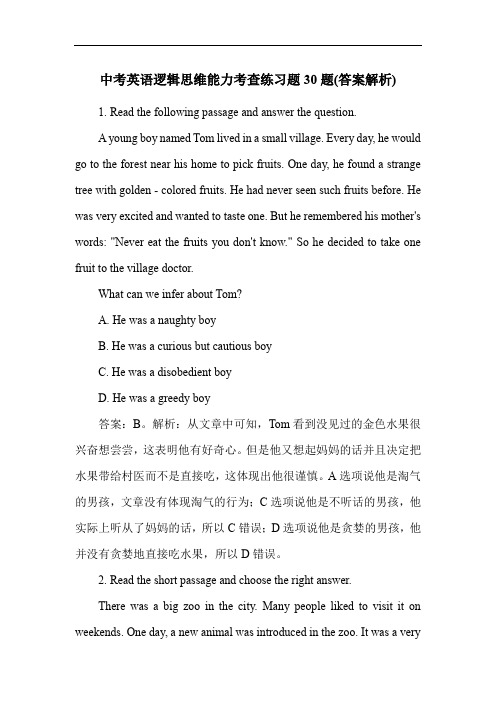
中考英语逻辑思维能力考查练习题30题(答案解析)1. Read the following passage and answer the question.A young boy named Tom lived in a small village. Every day, he would go to the forest near his home to pick fruits. One day, he found a strange tree with golden - colored fruits. He had never seen such fruits before. He was very excited and wanted to taste one. But he remembered his mother's words: "Never eat the fruits you don't know." So he decided to take one fruit to the village doctor.What can we infer about Tom?A. He was a naughty boyB. He was a curious but cautious boyC. He was a disobedient boyD. He was a greedy boy答案:B。
解析:从文章中可知,Tom看到没见过的金色水果很兴奋想尝尝,这表明他有好奇心。
但是他又想起妈妈的话并且决定把水果带给村医而不是直接吃,这体现出他很谨慎。
A选项说他是淘气的男孩,文章没有体现淘气的行为;C选项说他是不听话的男孩,他实际上听从了妈妈的话,所以C错误;D选项说他是贪婪的男孩,他并没有贪婪地直接吃水果,所以D错误。
2. Read the short passage and choose the right answer.There was a big zoo in the city. Many people liked to visit it on weekends. One day, a new animal was introduced in the zoo. It was a veryrare kind of monkey. People were very interested in it. But the zookeeper noticed that the monkey seemed unhappy. It didn't eat well and always looked sad. The zookeeper tried different foods but still couldn't make it happy.What can be inferred from this passage?A. The zookeeper didn't take good care of the monkeyB. The monkey was not used to the new environmentC. The monkey was illD. People didn't like the monkey答案:B。
中考英语逻辑思维能力考查练习题30题含答案解析
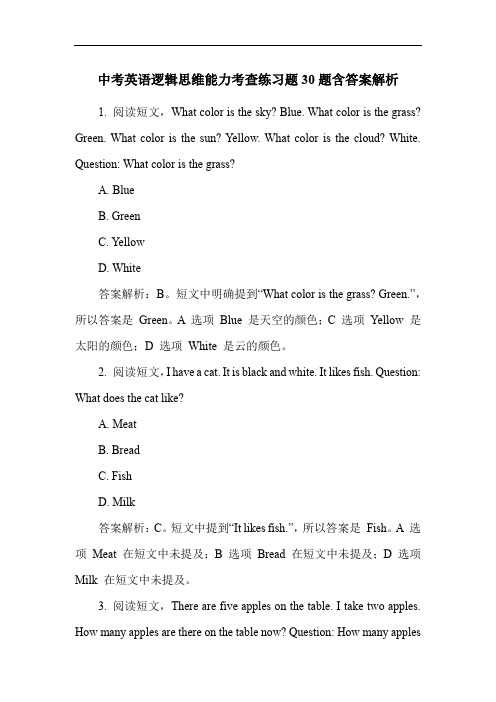
中考英语逻辑思维能力考查练习题30题含答案解析1. 阅读短文,What color is the sky? Blue. What color is the grass? Green. What color is the sun? Yellow. What color is the cloud? White. Question: What color is the grass?A. BlueB. GreenC. YellowD. White答案解析:B。
短文中明确提到“What color is the grass? Green.”,所以答案是Green。
A 选项Blue 是天空的颜色;C 选项Yellow 是太阳的颜色;D 选项White 是云的颜色。
2. 阅读短文,I have a cat. It is black and white. It likes fish. Question: What does the cat like?A. MeatB. BreadC. FishD. Milk答案解析:C。
短文中提到“It likes fish.”,所以答案是Fish。
A 选项Meat 在短文中未提及;B 选项Bread 在短文中未提及;D 选项Milk 在短文中未提及。
3. 阅读短文,There are five apples on the table. I take two apples. How many apples are there on the table now? Question: How many applesare there on the table now?A. TwoB. ThreeC. FiveD. Seven答案解析:B。
原来有五个苹果,拿走两个,还剩三个。
A 选项Two 是拿走的苹果数量;C 选项Five 是原来苹果的数量;D 选项Seven 错误计算。
4. 阅读短文,My father is a teacher. He teaches English. My mother is a doctor. She helps sick people. Question: What does my father do?A. DoctorB. NurseC. TeacherD. Driver答案解析:C。
高考英语极简语法思维导图与提升专练:第二章 代词例句练习及答案

【第二章代词例句】养成良好的答题习惯,是决定成败的决定性因素之一。
做题前,要认真阅读题目要求、题干和选项,并对答案内容作出合理预测;答题时,切忌跟着感觉走,最好按照题目序号来做,不会的或存在疑问的,要做好标记,要善于发现,找到题目的题眼所在,规范答题,书写工整;答题完毕时,要认真检查,查漏补缺,纠正错误。
总之,在最后的复习阶段,学生们不要加大练习量。
在这个时候,学生要尽快找到适合自己的答题方式,最重要的是以平常心去面对考试。
1.She gave me a red apple.2.Kath is near him.3.It isn’t my pen. → Mine(=my pen) is missing.4.I left my pen at home. You can use hers. (=her pen)5.A few days later, I myself had to go to Paris.6.She bought herself a new bag.7.He’s not worried about himself.8.For years, the two sisters looked after one another. (each other)9.We should learn from each other.10.They are looking at each other’s pictures.11.This is an apple tree, and that is an orange tree.12.These are my friends, and that is my sister.13.Two girls came and l gave an apple to each.14.Each of them has a nice ring.15.He has read every book (all the books) on the subject.16.Her parents are both doctors.17.Both of them are doctors.18.They both like potatoes.19.That’s all for today.20.All of us are from China.21.All the food is delicious.22.The two coats are cheap, so you can choose either of them.23.Neither of the books is/are so interesting.24.I have no brothers Or sisters.25.A clock has no mouth, but it can talk.26.There is no fire without some smoke27.None Of them has/have been to Japan.28.I like none of the books.29.I don’t know all of you.30.Not everyone Of us know how to go there.31.Would you please pass me the science book?----Which one?----The one on my shelf.32.No one has traveled farther than to the moon.33.Many Of the students come from England.34.Thanks, it’s too much for me.35.There were few people in the street last night.36.I am very worried that l have little time to finish the job.37.I call see a few cakes and a little bread in the fridge.38.There are quite a few students over there.39.There are some birds in the tree.40.There is some water in the bottle.41.I don’t have any brothers Of sisters.42.Is there any tea in the cup?43.Would you like some beer?44.Why didn’t you buy some sweets? (You should have bought……)45.There isn’t any water left.46.If you have any questions, put up your hands. Please.47.I’ll catch up with you some day.e any day you like.49.Tom is taller than any other student in his class.50.Mr. Smith has two daughters. 0ne is a teacher, the other is a nurse.51.I don’t want this One, please give me another.52.In Our school One Of the teachers is American, the Others are Chinese.53.Some students are reading, the others are drawing pictures.54.Some students like traveling, others (other students) like watching TV at home.55.He will be able to finish his work in another two hours.56.Someone is knocking at the door.57.There is something important on today’s newspaper.58.Something is wrong. Nothing is wrong.59.60.Do you have anything interesting to tell us?61.Is someone coming this afternoon?62.Anyone can make mistakes.63.Who wants to go with him?64.Who/Whom are you waiting for?65.Who/Whom do you want to meet?66.Who/Whom are they?67.Whose pen is this?68.Whose is this pen?69.Which girl is Kathy?70.Which is the boy’s ball?71.What’s on the table?72.What are you doing?73.What is he?74.What class are you in?75.This is the man who gave me the book.76.The money that/which is on the table is mine.77.The money that/which my mother gave me is on the table.【代词练习】1.(2023年新高考全国Ⅰ卷)Nanxiang aside, the best Xiao long bao have a fine skin, allowing them to be lifted out of the steamer basket without allowing them tearing or spilling any of ________ (they) contents.2.(2022全国乙卷) The Chinese Ancient Tea Museum was officially unveiled (揭幕) at the ceremony, opening __________ (it)first exhibition: The Avenue of Truth — A Special Exhibition of Pu’er Tea.3.(2022年北京卷) Since people can’t always eat out or cook for ________ (they), they get takeout or order delivery.4.(2021新高考1卷) As the song goes, this long and winding road "will never disappear", and it will always stick in the visitor’s memory. It sure does in(I).5.(2021全国乙卷) Ecotourism has(it) origin with the environmental movement of the 1970s.6.(2021浙江卷) She was extremely pretty, and her house was a reflection of(she), everything in good taste and in perfect order.7.(2020年新高考全国Ⅰ卷) Readers are encouraged to continue exploring the digital world with the guidance of (we)Further Resources section featured in each volume.8.(2020年新课标Ⅰ) Data about the moon’s composition, such as how much ice and other treasures it contains, could help China decide whether (it) plans for a future lunar (月球的) base are practical.9.(2020年新高考全国Ⅰ卷) As well as looking at exhibits, visitors can play with computer simulations (模拟) and imagine (they) living at a different time in history or walkingthrough a rainforest.10.(2020年北京卷) Nervously facing challenges, I know I will whisper to (I) the two simple words “Be yourself”.11.(2020年天津卷) A study shows the students who are engaged in after-school activities are happier than who are not.12.(2020年浙江卷) Many westerners who come to China cook much less than in their own countries once they realize how cheap can be to eat out.【代词答案】1.their2. its3. themselves4. mine5. its6. herself7.our8. its9. themselves10. myself11. those12. it高考质量提升是一项系统工程,涉及到多个方面、各个维度,关键是要抓住重点、以点带面、全面突破,收到事半功倍的效果。
适用于新高考新教材2025版高考英语二轮复习专项能力提升练阅读理解考点分类练4推理判断题2

考点分类练(四) 推理推断题(2)(限时:25分钟)Passage1(2024安徽淮南二模)From the time I was a young girl,all I wanted was to play outside.I used the ferns (蕨类植物) in my childhood backyard to raise myself up muddy Pacific Northwest slopes (斜坡),sat by the edge of the property’s wo oded stream and imagined it was a winding river.Hours were spent on horseback,prepared with bags and snacks to ride the same path over and over,always dreaming up a new experience.As an adult,my interests are consistent,though the landscape has shifted.For the last four years,I have had the opportunity to explore our Earth’s most remote cold water locations as an underwater videographer and ocean-focused naturalist,developing an appreciation and understanding for challenging corners of the globe.Though my travels have taken me from Antarctica to the Arctic,it’s the temperate in-between that captivatesme.During the last four years,Southeast Alaska,particularly the Inian Islands in its incredible wildness and productivity,has stolen my attention.My name is Alyssa Adler,I am the Inian Islands Institute’s 2024 Scientist in Residence and National Geographic grant recipient for project Tall Trees in Cold Seas.The natural beauty of the Inians is pure,but the environment works for it.Massive rushing tides (潮水) flood the Hobbit Hole twice daily,like an angry river.Sometimes I learn some meaningful and useful lessons the hard way.Transportation of extensive dive equipment required the help of people in Ketchikan,Gustavus and otherplaces.These lessons only allow my respect for this region to the full,teaching me how to be successful.I need to learn and understand the power and network of Southeast Alaska,both in the water and out.It’s all worth it to roll into the salty Pacific Ocean,turn on my cameras as I sink to the seafloor,and shine my lights on early spring in the Inian Islands.1.Whatisthepurposeofthefirstparagraph?A.To share an amazing story.B.To introduce a unique plant.C.To suggest a special river.D.To explain the author’s wish.2.What does the underlined word “captivate” mean in paragraph 2?A.Surprise.B.Discourage.C.Worry.D.Attract.3.WhatdoyouthinkofAlyssaAdler’sjob?A.Boring.B.Demanding.C.Challenging.D.Well-paid.4.Whatmessagedoesthetextconvey?A.Love breaks down barriers.B.Hard work finally pays off.C.Ups and downs make one strong.D.Enthusiasm fuels devotion.Passage2(2024广东湛江二模)As you walk around the UK in March,you might notice that some people are wearing a daffodil(水仙花) on their coats.The British wear these yellow flowers to show they support one of this country’s best-known charities:the Marie Curie Cancer Care.The Marie Curie Cancer Care tries to ensure everyone diagnosed with cancer is cared for in the best possible way.It also helps fund research into possible cures through other organizations.Founded in 1948,it has been continuing with its goal ever since.The charity was named after Marie Curie,a renowned scientist.She experimented with newly-discovered elements to create the theory ofradioactivity.Unfortunately,over-exposure to the radioactive elements made her develop a disease and die in 1934.Marie Curie won the Nobel Prize in two different fields.Because of her pioneering work which led to chemotherapy (化学疗法),thecharity shared the name of Marie Curie.The daffodil is one of the first plants to flower during spring in the UK,which marks the return of flowering plants to the ecosystem after winter.Because ofthis,the charity uses the daffodil as a metaphor for bringing life to other people through charitable giving.Everyone you see wearing a daffodil has donated money to the charity,but each daffodil is worth only what you want to pay for it.The charity does ask that youstick to a minimum amount of £1.The charity encourages people to start wearing their daffodils at the start of March,when the “Great Daffodil Appeal” kicks off.But that doesn’t mean you can only wear them in March.People are sometimes seen walking around with daffodils on their clothes all year round.5.What does it mean when the British wear a daffodil on their coats?A.They support a charity.B.They are recovering from cancer.C.They’ve been helped by a charity.D.They’ve been diagnosed with cancer.6.What does the underlined word “renowned” in paragraph 3 mean?A.Beautiful.B.Modest.C.Famous.D.Humorous.7.WhywasthecharitynamedafterMarieCurie?A.Because patients required that.B.Because it was launched by her.C.Because she greatly supported it.D.Because it could show respect for her.8.Whatcanwelearnaboutthedaffodilfromthetext?A.It can be used as medicine.B.It’s thought to stand for hope.C.It’s widely worn worldwide.D.It’s sold to the wearers at a high price.Passage3(2024辽宁鞍山二模)We have long been attracted by quick solutions that could increase our intelligence.Today,people’s hopes lie in brain training apps,some of which claim to result in “smarter minds”.But is this quick solution all it is said to be?There are plenty of brain training apps,but they all share the same characteristics:they turn mental exercises like simple arithmetic (算术),memory testsand logic and pattern-matching problems into quick games.Some apps tell us that the more you play these mini-games,the smarter you will get.It is really a big promise.Many of the apps say they are based on “science”,a claim I found surprising as a former neuroscientist (神经系统科学家).The concept that increasing intelligence would be as simple as practicing a few mini-games every day flies in the face of what we have discovered about how humans think and learn.After surveying thousands of users across a wide variety of apps,researchers at Western University in Canada discovered that brain training had no great effect on cognitive (认知的) functioning in the real world.The positive effects that have been found are limited to the very specific mini-games and tasks that users are trained on,such as the ability to memorize lists of words or numbers,or perform mental arithmetic,with little benefit to other skills.If you are expecting them to improve your ability to write a novel or make a complex computer program,I am afraid you will want to look elsewhere.Puzzle video games such as “Baba Is You” and “Return of the Obra Dinn”,see players apply their skill at logic,memory and concentration in a far more complex way than any brain training mini-game.9.What does the author say about brain training apps?A.They have scientific support.B.They work in the form of games.C.They require problem-solving skills.D.They are based on complex arithmetic.10.What does the underlined part “flies in the face of” in paragraph 3 mean?A.Goes into details of.B.Takes advantage of.C.Goes against.es from.11.Whichbestdescribestheeffectsthatbraintrainingappshaveonmemory?A.Limited.B.Indirect.C.Damaging.D.Far-reaching.12.Whatistheauthor’sattitudeto“BabaIsYou”?A.Doubtful.B.Intolerant.C.Uninterested.D.Favorable.答案:考点分类练(四) 推理推断题(2)Passage1[语篇解读]本文是一篇夹叙夹议文。
自考英语二各题型备考技巧总结

自考英语二各题型备考技巧总结-CAL-FENGHAI.-(YICAI)-Company One1自考英语二各题型备考技巧总结英语二是一门公共课程,对于有些专业它还是一门必考课程,自考《英语二》考试题包括客观性试题和主观性试题,分别占卷面总分的55%和45%,满分是100分。
试卷由七部分组成,包括:阅读判断、阅读选择、概括段落大意和补全句子、填句补文、填词补文、完形补文以及短文写作,下面看看自考英语二各题型的备考技巧总结。
第一部分阅读判断考生在作答时,最好先快速通读全文,尽可能理解文章大意和记忆关键信息点,然后阅读题目,准确定位题目的关键词,再带着这些关键词回到原文去查找相关的内容。
同时,建议考生按照题目顺序答题,这样有助于理清文章的写作思路。
考生在进行正误判断时,要善于抓住关键词。
题目的说法是否正确,完全由文章的内容决定,只有文章中明确表达出来的内容才能作为答题依据,切不可主观臆断,尤其是答案为NG的题目,其说法往往看起来是正确的,但是文章却并未提及,考生需要留意区别“错误”和“文中未提及”这两类选项,不可混为一谈。
因此做该类题目的原则是忠实原文、仔细甄别。
第二部分阅读选择(一)制订阅读计划,加强阅读训练考生首先要克服畏难情绪,自我暗示,加强英语阅读的信心。
在备考时,需要制订详实可行的阅读计划,保证每天的英语阅读时间,积累词汇量,通过反复训练提高阅读速度和阅读效率。
建议广大考生在平时阅读训练时注意以下几个方面:把握文章的主题、关键情节和背景知识,以便更好地理解文章写作意图;体会文章的主题给我们的启示和教育意义;养成写阅读概要的习惯,总结所读材料的主要内容;理清文章主要人物的姓名、身份、主要活动、心理特征以及他们之间的关系;理解文章中具有一定难度的语言点或与主题相关的主要语句,这往往也是题眼出现的地方。
(二)熟悉考核题型,总结答题技巧(1)事实细节题。
该类题目主要考查考生把握相关主题事实和细节的能力,考点多涉及时间、地点、人物、数字、原因等具体内容。
外研版小学英语五年级上册Module2 《Unit 2 How much cheese did you buy》课后作业练习
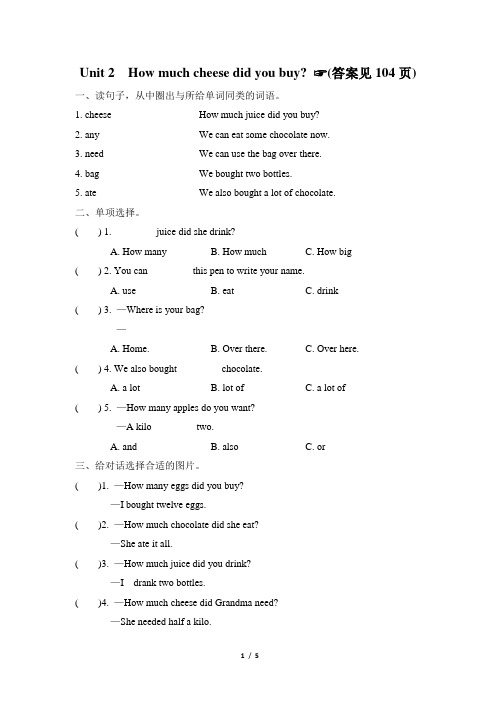
Unit 2How much cheese did you buy? ☞(答案见104页)一、读句子,从中圈出与所给单词同类的词语。
1. cheese How much juice did you buy?2. any We can eat some chocolate now.3. need We can use the bag over there.4. bag We bought two bottles.5. ate We also bought a lot of chocolate.二、单项选择。
() 1. ________ juice did she drink?A. How manyB. How muchC. How big() 2. You can ________ this pen to write your name.A. useB. eatC. drink() 3. —Where is your bag?—________A. Home.B. Over there.C. Over here.() 4. We also bought ________ chocolate.A. a lotB. lot ofC. a lot of() 5. —How many apples do you want?—A kilo ________ two.A. andB. alsoC. or三、给对话选择合适的图片。
()1. —How many eggs did you buy?—I bought twelve eggs.()2. —How much chocolate did she eat?—She ate it all.()3. —How much juice did you drink?—I drank two bottles.()4. —How much cheese did Grandma need?—She needed half a kilo.()5. —How many apples did Amy buy?—She bought six apples.0. 5kgA B C D E四、根据首字母提示补全单词。
10以内逆向思维加减法练习(10张480题下载可直接打印)

1+2=5+4=9+5=13+3=2+3=6+6=10+9=14+4=3+8=7+9=11+4=15+6=4+1=8+7=12+8=16+2=17+5=21+6=25+8=29+2=18+7=22+9=26+1=30+3=19+6=23+3=27+5=31+4=20+4=24+6=28+2=32+0=33+9=37+3=41+7=45+4=34+0=38+1=42+3=46+9=35+8=39+5=43+6=47+5=36+6=40+8=44+2=48+1=10101010( )( )101010101010101010101010( )( )( )( )( )10101010( )10101010101010101010( )( )1010101010101010( )101010101010( )( )( )( )( )10以内逆向思维加减法练习(一)____月____日 星期____ 姓名:__________ 开始时间:____________ 结束时间:____________ 对_____题,错_____题1010( )( )( )( )( )( )( )( )( )( )( )( )( )( )10101-2=5-8=9-6=13-7=2-3=6-1=10-9=14-5=3-8=7-5=11-4=15-6=4-1=8-2=12-6=16-1=17-5=21-6=25-8=29-2=18-7=22-9=26-1=30-3=19-6=23-4=27-5=31-5=20-4=24-6=28-2=32-0=33-9=37-3=41-7=45-4=34-0=38-1=42-3=46-9=35-8=39-5=43-6=47-5=36-6=40-8=44-2=48-1=328613( )10( )6( )5( )0( )1( )1( )( )316104432( )3( )32( )( )5( )1( )3327( )123( )2( )4( )8( )( )35( )1( )3( )27( )10以内逆向思维加减法练习(二)9( )2( )5( )1( )2( )2( )1____月____日 星期____ 姓名:__________ 开始时间:____________ 结束时间:____________ 对_____题,错_____题13+=56+=99+=138+= 24+=61+=102+=144+= 35+=78+=117+=153+= 42+=87+=125+=162+=171+=216+=252+=295+= 187+=229+=265+=306+= 198+=233+=278+=317+= 202+=244+=285+=323+= 337+=373+=419+=453+= 342+=388+=424+=468+= 351+=395+=432+=479+=364+=406+=447+=485+=10101010( )( )( )( )( )10( )10( )10( )10( )10( )10( )( )10( )10( )10( )10( )( )1010( )10( )10( )10( )10( )10( )1010( )10( )10( )10( )10( )10( )10( )10( )( )10( )10____月____日 星期____ 姓名:__________ 开始时间:____________ 结束时间:____________ 对_____题,错_____题( )( )( )( )10101010( )10( )10以内逆向思维加减法练习(三)( )10( )10( )1010( )10( )10( )10( )10( )1010( )10110-=510-=910-=1310-= 210-=610-=1010-=1410-= 310-=710-=1110-=1510-= 410-=810-=1210-=1610-=1710-=2110-=2510-=2910-= 1810-=2210-=2610-=3010-= 1910-=2310-=2710-=3110-= 2010-=2410-=2810-=3210-= 3310-=3710-=4110-=4510-= 3410-=3810-=4210-=4610-= 3510-=3910-=4310-=4710-=3610-=4010-=4410-=4810-=( )0( )5( )0( )( )4( )5( )6( )3( )79( )2( )( )6( )8( )( )1( )1( )3( )5( )5 9( )107( )7( )0( )6( )9( )8( )2( )2( )7( )1( )5( )68( )4( )8( )4( )9( )4( )31( )6( )3( )5( )3( )47( )10以内逆向思维加减法练习(四)____月____日 星期____ 姓名:__________ 开始时间:____________ 结束时间:____________ 对_____题,错_____题( )5( )4( )8( )( )191=555=919=1326= 282=646=1054=1463= 373=737=1135=1581= 464=828=1237=1651=1737=2146=2519=2964=1864=2253=2628=3050=1919=2373=2737=3172=2082=2481=2846=3291=3382=3781=4132=4552=3453=3834=4273=4643=3524=3954=4364=4754=3650=4053=4452=4855=( )( )( )+ +++++++++( )+++++++++++++ ++( )( )( )+++++( )( )( )( )( )( )+++++( )++( )+++++( )( )+++( )( )( )( )+( )( )( )( )( )( )++( )( )( )( )( )____月____日 星期____ 姓名:__________ 开始时间:____________ 结束时间:____________ 对_____题,错_____题( )( )( )10以内逆向思维加减法练习(五)172=583=981=1384= 294=698=1092=1495= 3103=7106=11108=15103= 455=895=1285=1675=1782=2184=2581=2987=1893=2295=2694=3096=1951=2353=2752=3150=2065=2463=2862=3260=3372=3773=4175=4577=3491=3895=4296=4698=3584=3982=4383=4787=3655=4050=4452=4854=-( )---( )-( )----( )-( )-( )--( )-( )-( )-( )-( )---( )-( )----( )-( )-( )--( )-( )-( )-( )-( )-( )-( )-( )( )-( )-( )-( )-( )-( )-( )-( )-10以内逆向思维加减法练习(六)____月____日 星期____ 姓名:__________ 开始时间:____________ 结束时间:____________ 对_____题,错_____题-( )--( )-( )1+2=5+7=9+6=13+4=2+3=6+1=10+9=14+5=3+8=7+4=11+4=15+6=4+1=8+6=12+3=16+1=177+=215+=254+=298+=189+=226+=262+=305+=193+=230+=277+=313+=201+=248+=283+=324+=3382=3742=4162=4573=3473=3872=4263=4691=3554=3954=4354=4754=3651=4053=4454=4845=( )( )( )( )( )( )( )( )( )1010( )( )( )( )( )( )( )( )( )( )( )+( )+++( )+( )++++( )+( )+( )+10+( )+( )+( )+( )10101010101010101010101010( )( )( )( )( )( )( )101010101010( )( )( )1010101010101010101010以内逆向思维加减法练习(七)____月____日 星期____ 姓名:__________ 开始时间:____________ 结束时间:____________ 对_____题,错_____题1-2=5-8=9-6=13-7=2-3=6-1=10-9=14-5=3-5=7-5=11-4=15-6=4-1=8-2=12-6=16-1=1710-=2110-=2510-=291-=1810-=2210-=2610-=3010-=1910-=2310-=2710-=3110-=2010-=2410-=2810-=3210-=3372=3781=4142=4554=3483=3895=4233=4693=3564=3954=4384=4794=3675=4055=4485=4853=-( )---( )-( )----( )-( )-( )-3( )9-( )-( )-( )-( )( )3( )6( )5( )8( )9( )8( )7( )2( )4( )6( )3( )3( )7( )5( )2( )10( )4( )0( )( )5( )4( )2( )6( )3( )110以内逆向思维加减法练习(八)____月____日 星期____ 姓名:__________ 开始时间:____________ 结束时间:____________ 对_____题,错_____题7( )1( )0( )14( )2182=582=982=1382= 273=691=1090=1482= 354=781=1182=15100= 461=835=1262=1645=1782=2172=2562=2942=1893=2283=2663=3033=1954=2364=2794=3184=2055=2475=2895=3285=3312=3772=4112=4581=3473=3803=4273=4691=3544=3964=4344=4728=3625=4035=4425=4852=+( )+++( )+( )++++( )+( )+( )+-( )+( )+( )+( )+( )---( )-( )----( )-( )-( )--( )-( )-( )-( )( )+( )+( )+( )+( )+( )+( )+( )+( )+( )+( )+( )+( )+( )+( )++10以内逆向思维加减法练习(九)____月____日 星期____ 姓名:__________ 开始时间:____________ 结束时间:____________ 对_____题,错_____题122=544=963=1387= 293=697=1095=1494= 3101=7103=11105=15106= 485=883=1281=1687=1722=2112=2532=2972=1843=2233=2653=3043=1964=2354=2764=3154=2085=2475=2855=3205=3382=3762=4172=4531=34103=3873=4293=4690=3554=39104=4364=4782=36105=4095=4450=4854=+----( )+( )---( )-( )-( )-( )-( )-+( )-( )-( )-( )-( )+++( )++++( )+( )+( )+( )( )-( )-( )-( )-( )-( )-( )-( )-+( )+( )+( )( )-( )-( )-( )-( )-( )-( )--10以内逆向思维加减法练习(十)____月____日 星期____ 姓名:__________ 开始时间:____________ 结束时间:____________ 对_____题,错_____题。
三义三向文本分析法大学英语教学再思考

于包容而非纯洁”、“维护汉语的纯洁性” …… 如何理 解这些矛盾的看法?)
实例来源 2
《全新版大学进阶英语》第1、2、3册 上海外语教育出版社,2017
横向思维:以 “Story of Technology”为主题
第1册 Unit 6“14 Days With (Almost) No Internet”
about Water 这个大问题?
三向思维的特质
♠ 基于教材,开发教材。 ♠ 锻炼思维,提升素养。 ♠ 以教师为主导,以学生为主体。 ♠ 始于教师,显于学生,师生共长。
文本教学模式
预习准备 活动检查
表层结构(3B) (basic idea, basic vocabulary, basic grammar)
逆向思维例2 messy?
Chinese: more pure or more
◆ B2U7TA “The Glorious Messiness of English” messiness of English! → → “messine,“保 卫汉语的纯洁性还是尊重语言事实?”、“汉语的伟大在
修辞义
谋篇义
横向思维
多向思维
逆向思维
何谓内文本分析?
◆ 内文本分析即以文体学和叙事学为指导,以文本
细读(close reading)为抓手,解读具体语境中 词汇的微妙含义、语法和句式的特殊功用、语篇 结构的创作意图、修辞手法的效力等。内文本分 析意在理解、赏析文本的文学性。
内文本分析的路径:三义
6
课文教学 →→ 文本教学
◆ 课文教学:
关注语言知识的传授,重视语言技能的操练。关注教学过 程的完整性和知识的系统性。
◆ 基于文本分析的文本教学:
中考英语创新思维培养练习题40题

中考英语创新思维培养练习题40题1.There is a lot of delicious food at the party. I'm so hungry that I can't wait to have a _____.A.tasteB.biteC.sipD.snack答案解析:A。
“taste”有“尝一尝”的意思;“bite”是“咬一口”;“sip”是“小口喝”;“snack”是“小吃”。
在这个语境中,说有很多美味食物,很饿所以迫不及待想尝一尝,“taste”更符合语境。
2.The artist is very creative. His paintings are full of _____ ideas.A.brightB.shinyC.cleverD.wise答案解析:C。
“bright”通常表示“明亮的”;“shiny”是“闪亮的”;“clever”有“聪明的、巧妙的”之意;“wise”是“明智的”。
这里说画家的画充满有创意的想法,“clever”更能体现想法的巧妙和有创意。
3.She is a kind girl. She always shows _____ to others.A.kindnessB.gentlenessC.politenessD.friendliness答案解析:D。
“kindness”是“善良”;“gentleness”是“温柔”;“politeness”是“礼貌”;“friendliness”是“友好”。
这里说她总是对别人表现出某种态度,“friendliness”更强调对他人的友好态度。
4.The book is so interesting that I can't put it _____.A.downB.awayC.offD.up答案解析:A。
“put down”是“放下”;“put away”是“收起来”;“put off”是“推迟”;“put up”是“张贴、搭建”。
高分英语作文逆向思维训练
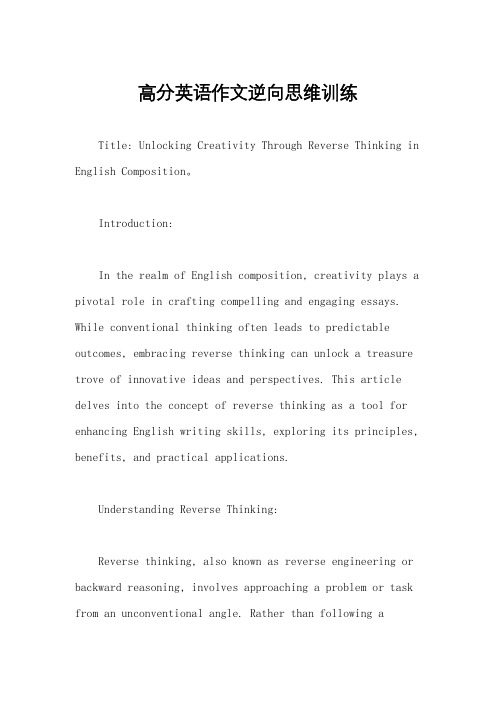
高分英语作文逆向思维训练Title: Unlocking Creativity Through Reverse Thinking in English Composition。
Introduction:In the realm of English composition, creativity plays a pivotal role in crafting compelling and engaging essays. While conventional thinking often leads to predictable outcomes, embracing reverse thinking can unlock a treasure trove of innovative ideas and perspectives. This article delves into the concept of reverse thinking as a tool for enhancing English writing skills, exploring its principles, benefits, and practical applications.Understanding Reverse Thinking:Reverse thinking, also known as reverse engineering or backward reasoning, involves approaching a problem or task from an unconventional angle. Rather than following alinear or predictable path, reverse thinking encourages individuals to challenge assumptions, question norms, and explore alternative viewpoints. It flips the traditional problem-solving process on its head, prompting individuals to consider the end goal first and then work backward to identify the steps needed to achieve it.Benefits of Reverse Thinking in English Composition:1. Stimulates Creativity: By breaking away from conventional thought patterns, reverse thinking stimulates creativity and encourages writers to generate original ideas. It allows for the exploration of unconventional perspectives and novel approaches to familiar topics, resulting in fresh and engaging content.2. Enhances Critical Thinking Skills: Reverse thinking cultivates critical thinking skills by prompting writers to analyze problems from multiple angles and consider the implications of various solutions. It encourages deeper reflection and evaluation, leading to more robust arguments and insightful analysis in written compositions.3. Fosters Innovation: In English composition, innovation is key to standing out amidst a sea of generic essays. Reverse thinking fosters innovation by challenging writers to think outside the box and experiment with unconventional narrative structures, rhetorical devices, and linguistic techniques. It pushes writers to push the boundaries of traditional writing norms, resulting in innovative and memorable compositions.Practical Applications of Reverse Thinking:1. Essay Prompts: When faced with a writing prompt, employ reverse thinking by brainstorming unconventional approaches to the topic. Consider how you can subvert expectations, challenge assumptions, or present a familiar topic in a completely new light. This approach can lead to unique and thought-provoking essays that capture the reader's attention from the outset.2. Character Development: In narrative writing, use reverse thinking to develop complex and multidimensionalcharacters. Instead of starting with a predefined character archetype, begin by envisioning the character's ultimate fate or personality traits and work backward to flesh out their backstory, motivations, and conflicts. This approach can result in more dynamic and realistic characters that resonate with readers on a deeper level.3. Argumentative Writing: When crafting an argumentative essay, employ reverse thinking to anticipate counterarguments and strengthen your position. Start by considering the opposing viewpoint or potential objections to your argument, and then strategically address these concerns within your essay. This approach demonstrates a nuanced understanding of the topic and enhances the persuasiveness of your argument.Conclusion:In the dynamic landscape of English composition, reverse thinking emerges as a powerful tool for unlocking creativity, enhancing critical thinking skills, and fostering innovation. By challenging conventional thoughtpatterns and embracing alternative perspectives, writers can breathe new life into their compositions and captivate readers with fresh and original content. Through practical application and deliberate practice, reverse thinking can become a cornerstone of effective writing, paving the way for boundless creativity and expression in the realm of English composition.。
中考英语逻辑思维能力考查练习题40题含答案解析
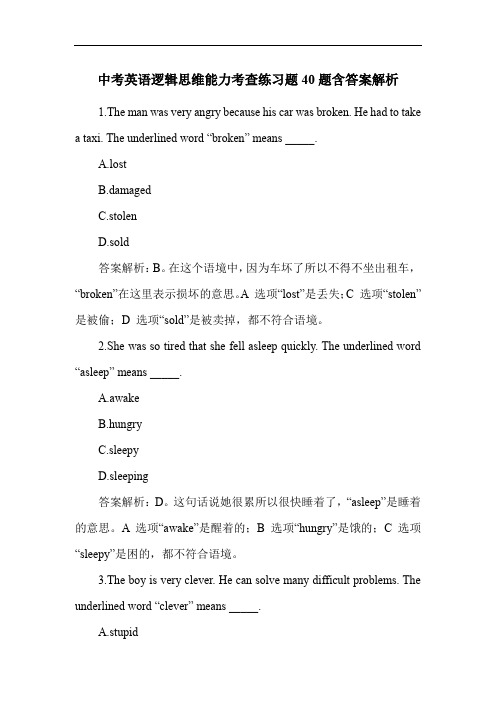
中考英语逻辑思维能力考查练习题40题含答案解析1.The man was very angry because his car was broken. He had to takea taxi. The underlined word “broken” means _____.A.lostB.damagedC.stolenD.sold答案解析:B。
在这个语境中,因为车坏了所以不得不坐出租车,“broken”在这里表示损坏的意思。
A 选项“lost”是丢失;C 选项“stolen”是被偷;D 选项“sold”是被卖掉,都不符合语境。
2.She was so tired that she fell asleep quickly. The underlined word “asleep” means _____.A.awakeB.hungryC.sleepyD.sleeping答案解析:D。
这句话说她很累所以很快睡着了,“asleep”是睡着的意思。
A 选项“awake”是醒着的;B 选项“hungry”是饿的;C 选项“sleepy”是困的,都不符合语境。
3.The boy is very clever. He can solve many difficult problems. The underlined word “clever” means _____.A.stupidB.smartzyD.busy答案解析:B。
在这个语境中,男孩能解决很多难题,所以“clever”是聪明的意思。
A 选项“stupid”是愚蠢的;C 选项“lazy”是懒惰的;D 选项“busy”是忙碌的,都不符合语境。
4.The weather is very bad today. It’s raining heavily. The underlined word “heavily” means _____.A.slightlyB.hardlyC.stronglyD.gently答案解析:C。
八年级英语课程拓展思路练习题50题(带答案)
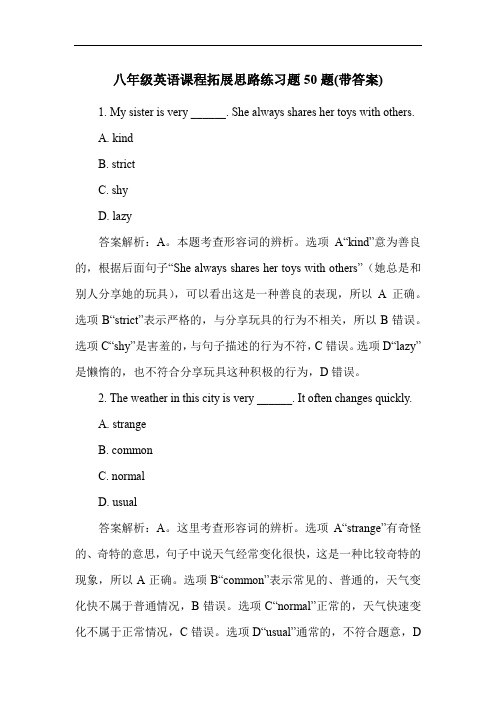
八年级英语课程拓展思路练习题50题(带答案)1. My sister is very ______. She always shares her toys with others.A. kindB. strictC. shyD. lazy答案解析:A。
本题考查形容词的辨析。
选项A“kind”意为善良的,根据后面句子“She always shares her toys with others”(她总是和别人分享她的玩具),可以看出这是一种善良的表现,所以A正确。
选项B“strict”表示严格的,与分享玩具的行为不相关,所以B错误。
选项C“shy”是害羞的,与句子描述的行为不符,C错误。
选项D“lazy”是懒惰的,也不符合分享玩具这种积极的行为,D错误。
2. The weather in this city is very ______. It often changes quickly.A. strangeB. commonC. normalD. usual答案解析:A。
这里考查形容词的辨析。
选项A“strange”有奇怪的、奇特的意思,句子中说天气经常变化很快,这是一种比较奇特的现象,所以A正确。
选项B“common”表示常见的、普通的,天气变化快不属于普通情况,B错误。
选项C“normal”正常的,天气快速变化不属于正常情况,C错误。
选项D“usual”通常的,不符合题意,D错误。
3. I'm so ______ because I got an A in the English exam.A. sadB. happyC. angryD. worried答案解析:B。
本题考查形容词的辨析。
选项A“sad”是悲伤的,得到A应该是高兴的事,不是悲伤的,A错误。
选项B“happy”高兴的,得到好成绩会高兴,B正确。
选项C“angry”生气的,与得到好成绩不相关,C错误。
选项D“worried”担忧的,不符合语境,D错误。
中考英语思维训练的方法与实践案例分析单选题40题
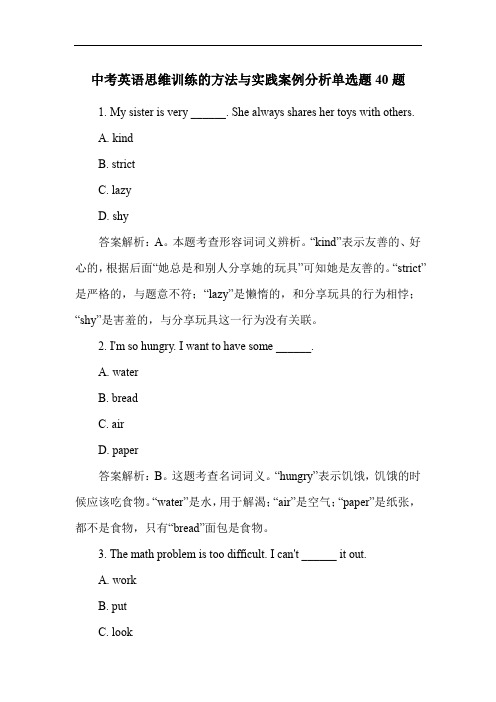
中考英语思维训练的方法与实践案例分析单选题40题1. My sister is very ______. She always shares her toys with others.A. kindB. strictC. lazyD. shy答案解析:A。
本题考查形容词词义辨析。
“kind”表示友善的、好心的,根据后面“她总是和别人分享她的玩具”可知她是友善的。
“strict”是严格的,与题意不符;“lazy”是懒惰的,和分享玩具的行为相悖;“shy”是害羞的,与分享玩具这一行为没有关联。
2. I'm so hungry. I want to have some ______.A. waterB. breadC. airD. paper答案解析:B。
这题考查名词词义。
“hungry”表示饥饿,饥饿的时候应该吃食物。
“water”是水,用于解渴;“air”是空气;“paper”是纸张,都不是食物,只有“bread”面包是食物。
3. The math problem is too difficult. I can't ______ it out.A. workB. putC. lookD. take答案解析:A。
这里考查动词短语搭配。
“work out”有算出、解决的意思,数学题难,算不出来用“work out”。
“put out”是扑灭;“look out”是小心;“take out”是拿出,都不符合题意。
4. There are a lot of ______ in the library. You can borrow some to read.A. picturesB. CDsC. booksD. toys答案解析:C。
根据“library”( 图书馆)这个场景可知里面有很多书。
“pictures”是图片;“CDs”是光盘;“toys”是玩具,都不是图书馆里常见的可借阅的物品。
中考英语思维训练的方法与实践案例分析单选题40题
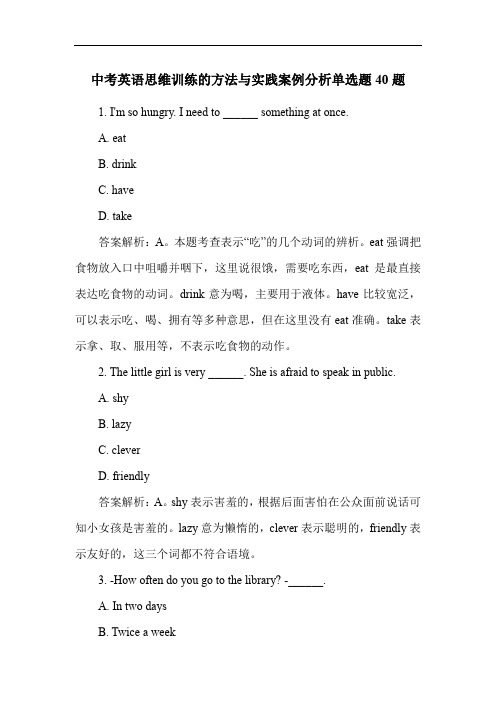
中考英语思维训练的方法与实践案例分析单选题40题1. I'm so hungry. I need to ______ something at once.A. eatB. drinkC. haveD. take答案解析:A。
本题考查表示“吃”的几个动词的辨析。
eat强调把食物放入口中咀嚼并咽下,这里说很饿,需要吃东西,eat是最直接表达吃食物的动词。
drink意为喝,主要用于液体。
have比较宽泛,可以表示吃、喝、拥有等多种意思,但在这里没有eat准确。
take表示拿、取、服用等,不表示吃食物的动作。
2. The little girl is very ______. She is afraid to speak in public.A. shyB. lazyC. cleverD. friendly答案解析:A。
shy表示害羞的,根据后面害怕在公众面前说话可知小女孩是害羞的。
lazy意为懒惰的,clever表示聪明的,friendly表示友好的,这三个词都不符合语境。
3. -How often do you go to the library? -______.A. In two daysB. Twice a weekC. For a weekD. Yesterday答案解析:B。
本题考查频率的表达。
Twice a week表示一周两次,是对how often(多久一次)的回答。
In two days表示两天后,用于一般将来时。
For a week表示持续一周的时间。
Yesterday表示昨天,是过去的时间,都不能回答频率的问题。
4. There are so many ______ in the zoo.A. deersB. deerC. a deerD. deer's答案解析:B。
deer的复数形式是deer本身,属于不规则复数形式。
A选项deers是错误的复数形式。
C选项a deer是单数形式,这里说动物园里有很多,要用复数。
英语逆向思维练习二

英语逆向思维练习二( )76.I raise 3_____ of cattle. The cattle _____ fed on grass and corn.A heads, isB head ,areC heads, areD head ,is( )77.I was not ______ tired and couldn’t go any further.A a littleB littleC bitD a bit( )78.I can hardly ______ my eyes; the pet is so lovely.A believeB believe inC trustD trust in( )79.I had no______ in the decision; I had nothing to do with it.A shareB sharesC sharingD shared( )80.He will soon_____ his disappointment and be quite cheerful again.A get overB get out ofC get awayD get through ( )81.He agreed ____ me ____ an early start, so he agreed ____ my proposal.A with ,to , onB to, with , onC with, on, toD on, to , with ( )82.When he came, we had _______ the chairs for the meeting in rows of ten.A set offB set aboutC set outD set up( )83.Every means _______ prevent the water from_______.A are used to , pollutingB get used to, pollutingC is used to , pollutedD is used to, being polluted( )84.There was a terrible noise _______ the sudden burst of light.A followedB followingC to be followedD be followed ( )85.Please tell it as it is. I don’t like ______ .A to be liedB to lie toC being lied toD being lied ( )86.The doctor gave me some medicine, ______ three times a day.A taken offB to be takenC taking overD to take ( )87.Our teacher is strict ______ us. He never allows us to write _____carelessly.A with , thatB with , such soC to, such asD to, so ( )88. Who would you rather _______ with you, Peter or _____?A have go, meB have gone , meC have to go, ID have gone ,I ( )89.It’s three weeks since he took the medicine, but the medicine doesn’t seem to _____.A affectB effectC workD make( )90._______ it with me and I’ll see what I can do.A When leftB LeavingC If you leaveD Leave( )91.----So, how is your new roommate?----She really____. She’s always making loud noises at midnight and when I remind her, she always makes rude remarks.A turns me overB turns me offC turns me downD turns me out ( )92.----Why is____ she put off going abroad for further education?----Because of SARS.A thatB whatC it thatD one( )93. ----What are you looking for?----I’m looking for a tool____.A and open the boxB with that to open the boxC and opening the boxD to open the box with( )94. ----I’ve passed the driving test!----I’m glad to hear that you ____ it at last!A didB gotC passedD made( )95.-----Did you stay in a hotel during your visit to Shanghai?----No. We stayed with one of my best friends. There’re enough rooms in his house toput us____.A upB inC onD down( )96. ----Is this Mr. White’s office, Linda?----Yes, Mr. Taylor. He’s waiting for us.____.A Of courseB After youC This way ,pleaseD Make yourself at home ( )97.-----____would you like your coffee, black or white?----White, please.A WhatB WhichC HowD How much( )98. ----Are you ready to leave ?----Almost. I’ll be ready to go just as soon as I ____ putting the clean dishes away.A get throughB give upC carry outD set about( )99.----Paul, I’d like to have a talk with you at the tea break.----____Have what with me?A Yes, please.B Sorry?C Thanks.D You’re welcome. ( )100.-----How did it ____that all the flowers died?----I had forgotten to water them.A come aboutB come backC come downD come from( )101.----I’ve got a new job in a factory. It’s a big one.---How many ____it?A works inB work inC work isD workers is( )102.----Are you sure that you have met him before?-----____I’m mistaken.A UnlessB WhetherC IfD Though( )103.----Thank you very much. ----My pleasure. I’m glad to have been ____.A of helpB helpedC helped outD help you( )104.----I’m told that you didn’t do the work. ----Oh,___!A No, I didB Yes, I didC No, I don’tD Yes, I didn’t( )105.----Have you read either novel of his written recently? ----____.A No. Neither will IB No. Nor will IC Yes, I’ve read them allD Yes, I have ( )106.----Shall we meet at 6:00 or at 6:30? ---______.A At any timeB Yes, at 6:30C Well, either time will doD Any time is OK ( )107.-----we’d better hurry; we’ll be late.-----____? Do you really want to listen to the boring lecture?A For whatB Take it easyC What onD So what( )108.-------I’m sorry I can’t go with you.------_____? Haven’t you agreed?A How is itB What is itC Why don’t youD What do you think ( )109.------What do you think of those curtains?------Oh, they ____very well with the wallpapers, I think.A suitB goC fitD take( )110.----It’s a wonderful party. -----It’s very nice of you to come.______.A Please do make yourself at homeB Please enjoy yourselfC Help yourselfD Have a good time( )111. -----I’ll be waiting for you at home.-----_____I were busy and couldn’t come.A What ifB What whenC How ifD How when ( ) 112. ----_____he open the door? ------Yes, please .A WillB DoesC WouldD Shall( )113. -----I don’t think everybody hates smoking,____?-----Perhaps you are right.A do IB don’t theyC doesn’t heD do they( )114.-----Have you been here long? ------_____.A No, not veryB Not too muchC Yes, only littleD No, Only yesterday ( )115.-----The film Harry Potter became very popular in England.----_____ the movie Hero in China.A Either didB So ,wasC Neither didD So did( )116.-----If you are free tonight, I’d like to invite you to a film.-----That’s very nice of you, but are you_____?A richB carefulC seriousD true( )117.----He doesn’t seem like the same person.-----_____so much in the society has made him more thoughtful.A Have experiencedB Had experiencedC Having experiencedD He experienced ( )118.-----Did he have anything to do with the trade ?-----Yes, he had a ____ in it.A handB headC legD foot( )119.------What do you think of that girl?-----She is ____ to sure of herself.A fairlyB quiteC ratherD pretty( )120. ----He seldom ____ you in the game, did he?-----No, he didn’t .A beatB defeatC lostD won( )121.-----They _____students, aren’t they?----- Yes, they _____.A are all ,are allB all are ,all areC are all ,all areD all are, are all ( )122. ----It’s _____ that all the people invited will come before nine.-------Don’t be so _____.A .certain ,certainB certain , sureC sure, sureD sure, certain ( )123. ----- I’d like to go to the cinema with you ,Dad.---- Sorry, my darling, but the film is _____ for adults only.A admittedB intendedC promisedD permitted( )124. -----The plan_____ for the trip is of great important , I think .-----I see, but John is sure to work it out on time.A madeB to be madeC makingD has been made ( )125. ----- Everybody in the city is very careful about SARS.------- Of course._______ ,they will be infected with it.A If notB HoweverC If soD Besides( )126.------Remember the first time we met, Mike?----- Of course I do. You _______ a lecture.A had givenB were givingC gaveD had given( )127. ---- I’m going downtown.------ Come on . ____.A I’ll give you a liftB You’re welcomeC Don’t do thatD Come with me ( )128. ------ _____?------ There is no doubt about it .A OKB SureC ReallyD Is that so( )129.-----How can I get to the island you mentioned ?------ You can’t get there _____ by swimming.A other thanB more thanC rather thanD less than( )130. ----Oh, it’s you .I _____ you. Why are looking so thin and pale?----- I’ve been ill for weeks.A can’t recognizeB could hardly recognizeC haven’t recognizedD wasn’t recognizing ( )131. ----Which of those electronic dictionaries do you like most?------_____.They are both expensive and of little use.A NeitherB NoneC AllD Both( )132.------Do you think it’s going to rain tonight? ------________.A I don’t believeB I don’t believe itC I believe not soD I believe not( )133.-----Do you like the material? -----Yes, it ______ very soft.A is feelingB feltC feelsD is felt( )134.-----Marry!-----_____,Mum?-----Come and help me to lay the table.A WhatB YesC All rightD Pardon( )135.------How much are these oranges_______?----3yuan.----Oh, it’s not expensive______.A at all, after allB after all , in allC in all, at allD at all, in all( )136.-----You don’t seem to be quite yourself today. What’s the matter?------Oh, I’m suffering from a cold. Nothing serious,_____.A yetB indeedC thoughD anyway( )137.-----I love you more than her, Child.------You mean more than ______ love her or more than she loves_____?A you, meB I , youC you, youD I, me( )138.------Could I stay here for the night? -----______.A With pleasureB My pleasureC Yes, of course you couldD It’s very kind of you ( )139.----- Time to get up. Don’t you hear the alarm clock is_____?-----Yeah, yeah. I’m dressing myself.A going offB going onC going outD going up( )140.------We’re going to have a picnic this morning. ------______!A Good luckB Have funC A pleasant tripD Take care( )141.------You ought to have warned him of the danger! ----_____! But he wouldn’t listen!A So did IB So ought youC So I didD So I have( )142.-----You won’t to go to Mary’s wedding party, will you? ----Yes._______ invited to.A Even ifB UnlessC IfD As if( )143.------You shouldn’t have gone there alone last night.------ But I _____, because Tom went there, too.A didn’tB had toC didD should( )144.------Do you have to leave now? ------Sorry, but I really_______.A can’tB haveC mustD should( )145.-----Would you like some more rice? ------______.A I’d likeB I’d like toC Yes, pleaseD Sorry ,but I’m full( )146.------Do you think going online does good to ids? ------______.A Yes, perfectlyB Well, it dependsC Nothing at allD Yes, I think it is( )147.-----What shall I do? I’m afraid to give a speech in public.------Don’t worry!____ sometimes will help you a lot when in danger.A Being braveB BraveC Be braveD Have been brave( )148.-----Was it in 2003 ______ Yang Liwei succeeded______ being launched into space?-----Quite right.A when, onB that ,onC when ,inD that ,in( )149.------Don’t you know I make the decision. ------_______, not until you ______me.A Yes, have toldB No, have toldC Yes ,tellD No, are telling( )150.----Are you satisfied with what he has said and done?-------Not in the least. It couldn’t be ____.A so badB much betterC any worseD the best逆向思维专练答案与解析1. A pick up ,拾起,收听,用车接,此处为改善、好转; pick out挑选出,看出;turn up 出现,露面;show out 领某人出去2 A can not/never -----too 怎么------也不为过3 B waste one’s breath doing something白费作某事;try to do something竭尽全力做某事try doing something 试做某事;persuade说服了某人做某事4 C no more than one表示仅仅,只有一个,故用it 特指提到的那一个5. B be up to somebody/something 多达,靠近,此处为正在做着或忙于某事; be up with something不舒服的根源或原因;be up for something 因过失等受审6. A get somebody/something doing使某人或某物做某事;get somebody/something to do 使或说服某人做某事;get something done 使某事被做7. D as far as I know为插入语,第三人称单数用 does 表示强调8. D changing现在分词作宾补表示正在发生的变化是过去分词宾补;to be changed将要被发生变化,语义不通; change强调变化的整个过程;changed表示已经发生了的变化9. C 本题的意思是使他们非常高兴的是他们盼望的那一天终于来到了。
- 1、下载文档前请自行甄别文档内容的完整性,平台不提供额外的编辑、内容补充、找答案等附加服务。
- 2、"仅部分预览"的文档,不可在线预览部分如存在完整性等问题,可反馈申请退款(可完整预览的文档不适用该条件!)。
- 3、如文档侵犯您的权益,请联系客服反馈,我们会尽快为您处理(人工客服工作时间:9:00-18:30)。
英语逆向思维练习二( )76.I raise 3_____ of cattle. The cattle _____ fed on grass and corn.A heads, isB head ,areC heads, areD head ,is( )77.I was not ______ tired and couldn’t go any further.A a littleB littleC bitD a bit( )78.I can hardly ______ my eyes; the pet is so lovely.A believeB believe inC trustD trust in( )79.I had no______ in the decision; I had nothing to do with it.A shareB sharesC sharingD shared( )80.He will soon_____ his disappointment and be quite cheerful again.A get overB get out ofC get awayD get through ( )81.He agreed ____ me ____ an early start, so he agreed ____ my proposal.A with ,to , onB to, with , onC with, on, toD on, to , with ( )82.When he came, we had _______ the chairs for the meeting in rows of ten.A set offB set aboutC set outD set up( )83.Every means _______ prevent the water from_______.A are used to , pollutingB get used to, pollutingC is used to , pollutedD is used to, being polluted( )84.There was a terrible noise _______ the sudden burst of light.A followedB followingC to be followedD be followed ( )85.Please tell it as it is. I don’t like ______ .A to be liedB to lie toC being lied toD being lied ( )86.The doctor gave me some medicine, ______ three times a day.A taken offB to be takenC taking overD to take ( )87.Our teacher is strict ______ us. He never allows us to write _____carelessly.A with , thatB with , such soC to, such asD to, so ( )88. Who would you rather _______ with you, Peter or _____?A have go, meB have gone , meC have to go, ID have gone ,I ( )89.It’s three weeks since he took the medicine, but the medicine doesn’t seem to _____.A affectB effectC workD make( )90._______ it with me and I’ll see what I can do.A When leftB LeavingC If you leaveD Leave( )91.----So, how is your new roommate?----She really____. She’s always making loud noises at midnight and when I remind her, she always makes rude remarks.A turns me overB turns me offC turns me downD turns me out ( )92.----Why is____ she put off going abroad for further education?----Because of SARS.A thatB whatC it thatD one( )93. ----What are you looking for?----I’m looking for a tool____.A and open the boxB with that to open the boxC and opening the boxD to open the box with( )94. ----I’ve passed the driving test!----I’m glad to hear that you ____ it at last!A didB gotC passedD made( )95.-----Did you stay in a hotel during your visit to Shanghai?----No. We stayed with one of my best friends. There’re enough rooms in his house toput us____.A upB inC onD down( )96. ----Is this Mr. White’s office, Linda?----Yes, Mr. Taylor. He’s waiting for us.____.A Of courseB After youC This way ,pleaseD Make yourself at home ( )97.-----____would you like your coffee, black or white?----White, please.A WhatB WhichC HowD How much( )98. ----Are you ready to leave ?----Almost. I’ll be ready to go just as soon as I ____ putting the clean dishes away.A get throughB give upC carry outD set about( )99.----Paul, I’d like to have a talk with you at the tea break.----____Have what with me?A Yes, please.B Sorry?C Thanks.D You’re welcome. ( )100.-----How did it ____that all the flowers died?----I had forgotten to water them.A come aboutB come backC come downD come from( )101.----I’ve got a new job in a factory. It’s a big one.---How many ____it?A works inB work inC work isD workers is( )102.----Are you sure that you have met him before?-----____I’m mistaken.A UnlessB WhetherC IfD Though( )103.----Thank you very much. ----My pleasure. I’m glad to have been ____.A of helpB helpedC helped outD help you( )104.----I’m told that you didn’t do the work. ----Oh,___!A No, I didB Yes, I didC No, I don’tD Yes, I didn’t( )105.----Have you read either novel of his written recently? ----____.A No. Neither will IB No. Nor will IC Yes, I’ve read them allD Yes, I have ( )106.----Shall we meet at 6:00 or at 6:30? ---______.A At any timeB Yes, at 6:30C Well, either time will doD Any time is OK ( )107.-----we’d better hurry; we’ll be late.-----____? Do you really want to listen to the boring lecture?A For whatB Take it easyC What onD So what( )108.-------I’m sorry I can’t go with you.------_____? Haven’t you agreed?A How is itB What is itC Why don’t youD What do you think ( )109.------What do you think of those curtains?------Oh, they ____very well with the wallpapers, I think.A suitB goC fitD take( )110.----It’s a wonderful party. -----It’s very nice of you to come.______.A Please do make yourself at homeB Please enjoy yourselfC Help yourselfD Have a good time( )111. -----I’ll be waiting for you at home.-----_____I were busy and couldn’t come.A What ifB What whenC How ifD How when ( ) 112. ----_____he open the door? ------Yes, please .A WillB DoesC WouldD Shall( )113. -----I don’t think everybody hates smoking,____?-----Perhaps you are right.A do IB don’t theyC doesn’t heD do they( )114.-----Have you been here long? ------_____.A No, not veryB Not too muchC Yes, only littleD No, Only yesterday ( )115.-----The film Harry Potter became very popular in England.----_____ the movie Hero in China.A Either didB So ,wasC Neither didD So did( )116.-----If you are free tonight, I’d like to invite you to a film.-----That’s very nice of you, but are you_____?A richB carefulC seriousD true( )117.----He doesn’t seem like the same person.-----_____so much in the society has made him more thoughtful.A Have experiencedB Had experiencedC Having experiencedD He experienced ( )118.-----Did he have anything to do with the trade ?-----Yes, he had a ____ in it.A handB headC legD foot( )119.------What do you think of that girl?-----She is ____ to sure of herself.A fairlyB quiteC ratherD pretty( )120. ----He seldom ____ you in the game, did he?-----No, he didn’t .A beatB defeatC lostD won( )121.-----They _____students, aren’t they?----- Yes, they _____.A are all ,are allB all are ,all areC are all ,all areD all are, are all ( )122. ----It’s _____ that all the people invited will come before nine.-------Don’t be so _____.A .certain ,certainB certain , sureC sure, sureD sure, certain ( )123. ----- I’d like to go to the cinema with you ,Dad.---- Sorry, my darling, but the film is _____ for adults only.A admittedB intendedC promisedD permitted( )124. -----The plan_____ for the trip is of great important , I think .-----I see, but John is sure to work it out on time.A madeB to be madeC makingD has been made ( )125. ----- Everybody in the city is very careful about SARS.------- Of course._______ ,they will be infected with it.A If notB HoweverC If soD Besides( )126.------Remember the first time we met, Mike?----- Of course I do. You _______ a lecture.A had givenB were givingC gaveD had given( )127. ---- I’m going downtown.------ Come on . ____.A I’ll give you a liftB You’re welcomeC Don’t do thatD Come with me ( )128. ------ _____?------ There is no doubt about it .A OKB SureC ReallyD Is that so( )129.-----How can I get to the island you mentioned ?------ You can’t get there _____ by swimming.A other thanB more thanC rather thanD less than( )130. ----Oh, it’s you .I _____ you. Why are looking so thin and pale?----- I’ve been ill for weeks.A can’t recognizeB could hardly recognizeC haven’t recognizedD wasn’t recognizing ( )131. ----Which of those electronic dictionaries do you like most?------_____.They are both expensive and of little use.A NeitherB NoneC AllD Both( )132.------Do you think it’s going to rain tonight? ------________.A I don’t believeB I don’t believe itC I believe not soD I believe not( )133.-----Do you like the material? -----Yes, it ______ very soft.A is feelingB feltC feelsD is felt( )134.-----Marry!-----_____,Mum?-----Come and help me to lay the table.A WhatB YesC All rightD Pardon( )135.------How much are these oranges_______?----3yuan.----Oh, it’s not expensive______.A at all, after allB after all , in allC in all, at allD at all, in all( )136.-----You don’t seem to be quite yourself today. What’s the matter?------Oh, I’m suffering from a cold. Nothing serious,_____.A yetB indeedC thoughD anyway( )137.-----I love you more than her, Child.------You mean more than ______ love her or more than she loves_____?A you, meB I , youC you, youD I, me( )138.------Could I stay here for the night? -----______.A With pleasureB My pleasureC Yes, of course you couldD It’s very kind of you ( )139.----- Time to get up. Don’t you hear the alarm clock is_____?-----Yeah, yeah. I’m dressing myself.A going offB going onC going outD going up( )140.------We’re going to have a picnic this morning. ------______!A Good luckB Have funC A pleasant tripD Take care( )141.------You ought to have warned him of the danger! ----_____! But he wouldn’t listen!A So did IB So ought youC So I didD So I have( )142.-----You won’t to go to Mary’s wedding party, will you? ----Yes._______ invited to.A Even ifB UnlessC IfD As if( )143.------You shouldn’t have gone there alone last night.------ But I _____, because Tom went there, too.A didn’tB had toC didD should( )144.------Do you have to leave now? ------Sorry, but I really_______.A can’tB haveC mustD should( )145.-----Would you like some more rice? ------______.A I’d likeB I’d like toC Yes, pleaseD Sorry ,but I’m full( )146.------Do you think going online does good to ids? ------______.A Yes, perfectlyB Well, it dependsC Nothing at allD Yes, I think it is( )147.-----What shall I do? I’m afraid to give a speech in public.------Don’t worry!____ sometimes will help you a lot when in danger.A Being braveB BraveC Be braveD Have been brave( )148.-----Was it in 2003 ______ Yang Liwei succeeded______ being launched into space?-----Quite right.A when, onB that ,onC when ,inD that ,in( )149.------Don’t you know I make the decision. ------_______, not until you ______me.A Yes, have toldB No, have toldC Yes ,tellD No, are telling( )150.----Are you satisfied with what he has said and done?-------Not in the least. It couldn’t be ____.A so badB much betterC any worseD the best逆向思维专练答案与解析1. A pick up ,拾起,收听,用车接,此处为改善、好转; pick out挑选出,看出;turn up 出现,露面;show out 领某人出去2 A can not/never -----too 怎么------也不为过3 B waste one’s breath doing something白费作某事;try to do something竭尽全力做某事try doing something 试做某事;persuade说服了某人做某事4 C no more than one表示仅仅,只有一个,故用it 特指提到的那一个5. B be up to somebody/something 多达,靠近,此处为正在做着或忙于某事; be up with something不舒服的根源或原因;be up for something 因过失等受审6. A get somebody/something doing使某人或某物做某事;get somebody/something to do 使或说服某人做某事;get something done 使某事被做7. D as far as I know为插入语,第三人称单数用 does 表示强调8. D changing现在分词作宾补表示正在发生的变化是过去分词宾补;to be changed将要被发生变化,语义不通; change强调变化的整个过程;changed表示已经发生了的变化9. C 本题的意思是使他们非常高兴的是他们盼望的那一天终于来到了。
